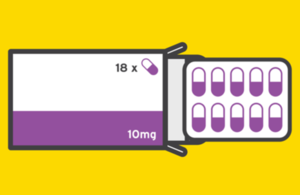New SCOPE ADR e-learning module receives European-wide CME/CPD accreditation
A new e-learning module on the importance of reporting suspected side effects to medicines has received European accreditation.

Pill box graphic
Doctors across Europe can now learn more about the importance of reporting suspected adverse drug reactions (ADRs) via a free e-learning module.
Prompt reporting helps make medicines safer and is part of a doctor’s responsibility. This includes informing patients and carers how they can help by reporting suspected side effects themselves.
Regulators like the Medicines and Healthcare products Regulatory Agency (MHRA) rely on the reporting of suspected ADRs to make sure medicines on the market are acceptably safe. However, all reporting systems suffer from underreporting, and training healthcare professionals to report suspected ADRs is important to both raise awareness and help strengthen the system.
The e-learning module has now received the highest order of accreditation from the European Accreditation Council for CME (EACCME®). This means doctors are awarded 1 EACCME credit upon completion of the 45 minute ADR e-learning module.
The ADR e-learning module was created by the Strengthening Collaboration for Operating Pharmacovigilance in Europe (SCOPE) Joint Action project.
A survey conducted by SCOPE found many European countries lacked sustainable educational materials about ADR reporting. This e-learning aims to support healthcare professionals and medicines regulators by providing clear guidance which is rewarded with CME/CPD points.
Mick Foy, group manager for MHRA’s Vigilance and Risk Management of Medicines division said:
The key aim of our work is to make sure medicines are effective and acceptably safe. The reporting of suspected ADRs is vital in helping us achieve this aim.
Doctors are critical to this as their position on the front line of care means they are often the first to recognise an adverse drug reaction.
We’ve created this e-learning module help doctors so they can have confidence that their reports are making a difference.
All healthcare professionals, and indeed patients themselves, can help make medicines safer by reporting any suspected side effects easily and quickly through our Yellow Card Scheme online or via the mobile app. Other countries collect reports in similar methods.
Notes to Editor
- The e-learning module is hosted on the SCOPE website. Learners are asked to complete a short survey upon completion of the e-learning.
- The Medicines and Healthcare products Regulatory Agency is responsible for regulating all medicines and medical devices in the UK by ensuring they work and are acceptably safe. All our work is underpinned by robust and fact-based judgements to ensure that the benefits justify any risks. MHRA is a centre of the Medicines and Healthcare products Regulatory Agency which also includes the National Institute for Biological Standards and Control (NIBSC) and the Clinical Practice Research Datalink (CPRD). MHRA is an executive agency of the Department of Health.
- National reporting systems for the collection of suspected adverse drug reactions (commonly known as side effects) have acted as early warning systems to help identify numerous important safety issues, many of which were not recognised as being related to a particular medicine until reports were received by medicines regulators www.mhra.gov.uk/yellowcard
- The SCOPE Joint Action project aims to support EU member states in the operation of their pharmacovigilance systems which help safeguard public health. It is funded through contributions from European Commission and the involved Member States.
- The SCOPE Joint Action project social media campaign to raise awareness levels of national ADR reporting systems is being taken forward through the Heads of Medicines Agencies Working Group for Communications Professionals.
- The European Union of Medical Specialists (Union Européenne des Médecins Spécialistes – UEMS) is a non-governmental organisation representing national associations of medical specialists in the European Union and in associated countries. Current membership includes 37 countries.
Media enquiries
News centre
MHRA10 South Colonnade
London
E14 4PU
Email newscentre@mhra.gov.uk
Telephone (including out of hours): 020 3080 7651